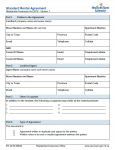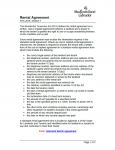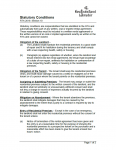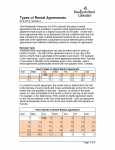A rental agreement can be written, oral, or implied. All grant the tenant the right to occupy and use a residential premises in exchange for paying rent to the landlord and all three fall under the exact same rules in terms of rights and obligations.
With a written rental agreement all of the conditions, including the amount of rent and any rules, would be written on paper and signed by the landlord and the tenant. An oral rental agreement would be where the landlord and tenant discussed the details verbally and came to an agreement but did not put anything in writing. An implied rental agreement is slightly different. With an implied rental agreement nothing has been discussed in detail but because of the circumstances it is assumed that a rental agreement exists.
It may be easier to explain the concept of an implied rental agreement with an example. Let’s say a landlord has a basement apartment that is currently unoccupied, and they offer it to a friend in need. No details have been discussed and there is no written agreement, but the landlord’s friend has been in the apartment for a few months and has been paying the landlord $500 per month in rent. The fact that the friend has been paying rent and living in the unit and the landlord has been accepting the rent money would create a landlord-tenant relationship. Since money is being paid in exchange for the right to occupy a residential premises there would be an implied rental agreement between the two parties.
Where a landlord and tenant enter into an oral or implied rental agreement the landlord must provide the tenant with a written notice containing the information shown below within ten days. Where requested by the landlord the tenant shall sign an acknowledgement of receipt. Where a landlord has not complied the tenant’s obligation to pay rent is suspended and the landlord shall not require the tenant to pay rent until the landlord provides the required information to the tenant. Once the landlord provides the necessary information the tenant is responsible for paying any rent that was withheld from the landlord.
A written notice of an oral or implied rental agreement from the landlord must include the following information:
- the correct legal names of the landlord and tenant
- the telephone number, electronic address and civic address of the landlord where documents may be received, delivered or served by the tenant (section 7(7)(a))
- the telephone number, electronic address and civic address of the landlord’s agent where documents may be received, delivered or served by the tenant (section 7(7)(b))
- telephone and electronic address of the tenant where documents may be received, delivered or served by the landlord
- the civic address of the rental unit
- the date the rental agreement was entered into
- the statutory conditions identified in section 10 of the Act
- the date the tenancy starts
- the type of rental agreement: (i) week to week; (ii) month to month; (iii) fixed term
- the termination date of a fixed term tenancy
- the amount of rent payable for a specified period
- the day in the specified period (i.e. week, month) on which rent is due;
- the other terms and conditions including services, furnishings and other equipment or facilities included in the rental agreement
- the amount of any security deposit paid
- the date on which any security deposit was paid
Landlords can use the Standard Rental Agreement form available from Service NL for this purpose. A copy of this form can be found in the Documents section below.
Types of Rental Agreements
There are different types of rental agreements, each with some slightly different rules, depending on the length of time covered by the agreement. A rental agreement can be from week to week, from month to month, or for a fixed term.
With a week to week tenancy the tenant would pay rent on a weekly basis. The amount of notice required for a landlord or tenant to terminate the rental agreement is also shorter. More information on that can be found in our Help Topic about Termination Notices.
In a month to month tenancy a tenant would pay rent on a monthly basis, and a landlord or tenant can terminate the rental agreement at any time by providing proper notice as described in our Help Topic about Termination Notices.
With a fixed-term rental agreement the landlord is agreeing to rent to the tenant, and the tenant is agreeing to pay rent to the landlord, for a specific period of time. Most commonly this comes in the form of a one-year lease. A fixed-term rental agreement cannot be terminated unless there is a violation of the Residential Tenancies Act or rental agreement, or the rental agreement expires.
A fixed-term rental agreement can only be for a period of time between six and twelve months. A rental agreement that is for less than six months is considered to be a month to month agreement. A rental agreement cannot be longer than twelve months. Any rental agreement that is entered into for a duration longer than twelve months would switch to a month to month agreement after the first year regardless of what period of time the agreement was for.
If a fixed-term rental agreement expires and neither the landlord or tenant has served a termination notice the rental agreement automatically switches to a month to month agreement, with all of the same rules and conditions as the original rental agreement. A rental agreement doesn’t just end when the expiry date comes, it continues as a month to month agreement unless it is terminated by the landlord or tenant.
Contact Information
A landlord must provide a tenant with a written notice stating the landlord’s name, phone number, and an address where notices can be served. If the landlord has an agent or property manager taking care of a rental unit the landlord must also provide their name, phone number, and address. If the property is sold or transferred to a new owner during the term of a tenancy the new owner is also obligated to provide the tenant with a written notice containing their name, phone number, and address. If at any time the information listed here changes, the tenant should be notified in writing. Essentially, the law requires that a landlord always provide a tenant with up-to-date contact information for themselves and anyone responsible for the property on their behalf.
Mandatory Information
When a rental agreement is entered into with a new tenant the landlord is obligated by law to provide the tenant with a copy of the Residential Tenancies Act. This is mandatory regardless of whether the rental agreement is written, oral, or implied, and regardless of whether the agreement is week to week, month to month, or for a fixed-term.
If a landlord and tenant enter into a written rental agreement the landlord is required to provide a signed copy of the agreement to the tenant within ten days of it being signed. If the landlord does not provide a copy of the signed rental agreement within ten days, the tenant is permitted to withhold rent until a copy is provided! This is because a written rental agreement is supposed to provide some protections for both the landlord and the tenant. It wouldn’t be fair for a landlord to have a signed copy of the agreement, and the protections that come along with that, while preventing the tenant from having the same protections by refusing to provide a copy of the agreement.
Any written rental agreement must also include the conditions set out in Section 10. (1) of the Residential Tenancies Act exactly as they are written in the Act. You can find more information about this in our Help Topic about Statutory Conditions.






